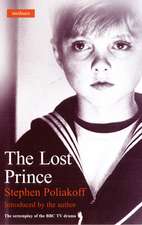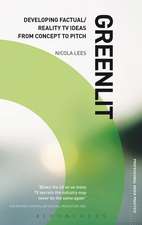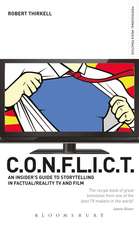Watching Arabic Television in Europe: From Diaspora to Hybrid Citizens
Autor Christina Sladeen Limba Engleză Hardback – 25 mar 2014
Preț: 385.47 lei
Nou
Puncte Express: 578
Preț estimativ în valută:
73.78€ • 80.17$ • 62.02£
73.78€ • 80.17$ • 62.02£
Carte tipărită la comandă
Livrare economică 21 aprilie-05 mai
Preluare comenzi: 021 569.72.76
Specificații
ISBN-13: 9781137352422
ISBN-10: 1137352426
Pagini: 150
Ilustrații: X, 150 p.
Dimensiuni: 140 x 216 x 13 mm
Greutate: 0.35 kg
Ediția:2014
Editura: Palgrave Macmillan UK
Colecția Palgrave Pivot
Locul publicării:London, United Kingdom
ISBN-10: 1137352426
Pagini: 150
Ilustrații: X, 150 p.
Dimensiuni: 140 x 216 x 13 mm
Greutate: 0.35 kg
Ediția:2014
Editura: Palgrave Macmillan UK
Colecția Palgrave Pivot
Locul publicării:London, United Kingdom
Cuprins
Acknowledgements Introduction 1. 'Dark Tribalism': Does Arabic Television Undermine Integration in Europe? 2. Arabic Citizens of Europe: Nativism, Formal and Cultural Citizenship 3. Europe Remediated: a Transnational Public Sphere? 4. Television Diaries: Arab Media Consumption in the EU 5. 'Arabic is Important to Me': Making Sense of Media 6. 'Citizenship Means Belonging': Arabic Speaking Europeans 7. From Diaspora to Hybrid Citizen: Communicating across Difference Bibliography Index
Recenzii
'The first study to investigate the relationship between media consumption and notions of belonging among Arabic speakers across European borders, this is a timely and comprehensive work that should be consulted by European policymakers and multiculturalism sceptics alike' - Times Higher Education
"Challenging long-held perceptions about the assumed exclusionary impact of Arabic TV broadcasting within Europe, Slade debunks this notion impressively with nuanced theoretical argumentation, empirical data and field research in six European countries. A must-read for media academics and policy makers alike, this book deservedly and at the best possible time lands right at the heart of the debates on Arab communities in Europe, identity and citizenship issues.' - Khaled Hroub, Northwestern University, Qatar
'Media consumption and citizenship are linked in numerous ways, far more than most people realize. Christina Slade's study probes deeply into the nature of being European and the nature of being Arab, and how intersections of the two are affected by satellite television. This work will prove invaluable for anyone interested in how Arabic television channels are influencing the future of Europe." - Philip Seib, University of Southern California, USA
"This book represents a very persuasive argument for a better understanding of Arabic television. Often in Europe we think only in stereotypes about Arab culture and behaviour, attitudes to women beinga prime example. Christina Slade's sophisticated and knowledgeable findings are of great importance in helping, by the means of television, to correct much of this. Having worked and travelled extensively in the Arab world for many years, I can see that her book will help shatter the stereotypical ideas some Europeans have of their Arab neighbours." - Baroness Nicholson of Winterbourne
'The first study to investigate the relationship between media consumption and notions of belonging among Arabic speakers across European borders, this is a timely and comprehensive work that should be consulted by European policymakers and multiculturalism sceptics alike.' - Zahera Harb, Times Higher Education, March 2014.
'The book's greatest strengths lie in Slade's commitment to widening the debate around citizenship, integration and transnational belonging past the boundaries of media theory.' - Cheryl Brumley, LSE Review of Books, 2014
"Challenging long-held perceptions about the assumed exclusionary impact of Arabic TV broadcasting within Europe, Slade debunks this notion impressively with nuanced theoretical argumentation, empirical data and field research in six European countries. A must-read for media academics and policy makers alike, this book deservedly and at the best possible time lands right at the heart of the debates on Arab communities in Europe, identity and citizenship issues.' - Khaled Hroub, Northwestern University, Qatar
'Media consumption and citizenship are linked in numerous ways, far more than most people realize. Christina Slade's study probes deeply into the nature of being European and the nature of being Arab, and how intersections of the two are affected by satellite television. This work will prove invaluable for anyone interested in how Arabic television channels are influencing the future of Europe." - Philip Seib, University of Southern California, USA
"This book represents a very persuasive argument for a better understanding of Arabic television. Often in Europe we think only in stereotypes about Arab culture and behaviour, attitudes to women beinga prime example. Christina Slade's sophisticated and knowledgeable findings are of great importance in helping, by the means of television, to correct much of this. Having worked and travelled extensively in the Arab world for many years, I can see that her book will help shatter the stereotypical ideas some Europeans have of their Arab neighbours." - Baroness Nicholson of Winterbourne
'The first study to investigate the relationship between media consumption and notions of belonging among Arabic speakers across European borders, this is a timely and comprehensive work that should be consulted by European policymakers and multiculturalism sceptics alike.' - Zahera Harb, Times Higher Education, March 2014.
'The book's greatest strengths lie in Slade's commitment to widening the debate around citizenship, integration and transnational belonging past the boundaries of media theory.' - Cheryl Brumley, LSE Review of Books, 2014
Notă biografică
Christina Slade became Vice-Chancellor of Bath Spa University, UK, following deanships at City University London and Macquarie University Sydney. She was also Professor of Media Theory at Utrecht University where she led the project on Arabic speakers in Europe, which is the basis of this book.











